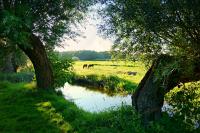
In 2020, organic acreage in the Netherlands increased by 5.9% to 79.664 ha on 2019, according to the annual organic industry figures published by Skal Biocontrol. The number of registered agricultural holdings grew from 2,076 to 2,115. Despite the growth, fewer farmers switched to organic (22% less) for the sixth year in a row. A trend that started in 2016: that year 245 farmers made the switch, in 2019: 124 and in 2020: 96 farmers. A decline caused not only by the uncertainty regarding agricultural policy in the Netherlands but also by lagging demand.
The organic market share in Dutch supermarkets remains relatively small with 3.2% (Bionext trend report 2019). "If the demand for organic products were to rise, farmers would consider switching. This requires stimuli, for example with a public campaign from the government and retailers that are open to stimulating the purchase of organic products in the store. We see that it is possible during BioKennisWeek. If more consumers buy organic, there are plenty of farmers who want to switch. Because they are entrepreneurs who look for opportunities," says Michael Wilde, CEO of Bionext, the trade association for the organic industry.
An uncertain vision of the future and the uncertainty concerning the agricultural policy mean that more farmers decide to stop. Despite this, organic farming goes against the trend: organic acreage and the number of registered organic growers has increased slightly. This means that the share of organic acreage is increasing in relation to the total acreage. The growth in organic acreage comes mainly from existing organic farms that are already certified.
Source: Organic Fresh Plaza



